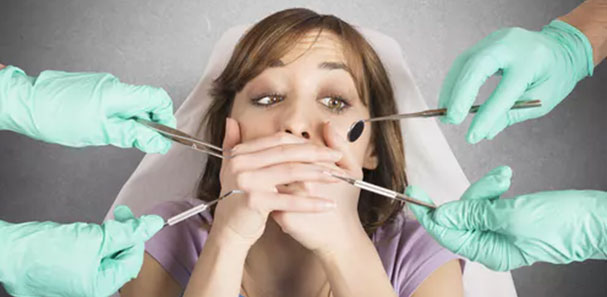Dental Anxiety

Dental Anxiety
Dental anxiety is the term for fear, anxiety or stress in a dental setting. It can be associated with triggers such as needles, drills or the dental place in general. When it is severe and results in irrational fear and complete avoidance of visiting the dentist, it can be classified as a dental phobia. Dental anxiety is common and affects people of any age. Children that have had bad dental experiences can usually overcome their situation is handled well and they are cared for during further dental visits. With adults, it is generally more difficult to treat this and they may remain anxious throughout their life. Statistics from the Oral Health Foundation show that almost half of UK adults have a fear of the dentist, with 12% of these suffering from an extreme dental anxiety or phobia. Fearing the dentist is ranked as even more common than a fear of heights. The OHF also found that nearly half the UK population are unhappy with their teeth, 31% of adults have tooth decay and 29% suffer from regular dental pain.
A survey carried out by Fletchers Solicitors on the behaviours British adults exhibit in relation to visiting the doctor, dentists and opticians. They found out the top reasons for apprehension of medical appointments were:
-
Finding a previously unknown health problem – 69%
-
Phobia of medical equipment – 52%
-
Bad childhood memory – 45%
-
Previous bad experience – 22%
-
Potential pain – 14%
Common signs
-
Feeling embarrassed or angry with yourself or the dentist
-
Having negative thoughts about what might happen
-
Trouble sleeping the night before a dental exam
-
Sweaty hands, feeling tense, butterflies in the stomach
-
Avoiding going to the dentist completely, or avoiding specific procedures through making excuses often or cancelling appointments last minute
-
Panic or trouble breathing when objects are placed in the mouth during a dental appointment
What causes it
As with any anxiety, fear of the dentist can manifest in various ways:
-
Past traumatic dental or other healthcare experience
-
Fear of medical equipment
-
Fear of potential pain
-
Previous trauma to the head and/or neck
-
Other trauma such as abuse
-
General anxiety, depression or PTSD
-
Trust issues
-
Viewing the mouth as a very personal area, and a dentist accessing it as an invasion of privacy
-
Other anxiety conditions such as agoraphobia (fear of being in a situation where you can’t escape), claustrophobia (fear of closed spaces), or OCD with an obsession around cleanliness
Long term impact on your oral health
Avoiding the dentist regularly can result in untreated development of a dental disease, worsening of a disease and a greater need for emergency care or complex treatment. This in turn can feed into the underlying anxiety, through a combination of increased fear, shame or guilt, creating a cycle of anxiety. Most dental disease is lifestyle-related and preventable, so by avoiding visiting your dentist, you are also likely preventing yourself from learning how to take better care of your oral health.
How to address it

Psychological
In an environment where you feel fear, your five senses are heightened. This means in a dental cabinet, you are more likely to pay attention to things such as how the clinical environment looks, the smell the products, the sounds of the instruments and the touch of your dentist. By working with your dental team, you can shift to a more positive and confident state in dental environments, and start being proactive in visiting regularly.
Techniques for relaxing before your appointment:
-
Write a list of things you feel OK with and things you are most scared of
-
Listen to your own music with earphones, your dentist won’t mind if you take it with you
-
Solve a puzzle in your head – a good way to distract yourself
-
Try breathing exercises to have something to focus on
-
Ask questions if you want to know more details of what will happen during your appointment and how long it will take
-
Plan signals you will use with your dentist if you want them to stop or you need a break during treatment
-
Reward yourself afterwards, so that going to the dentist becomes a positive experience
It can also help to:
-
Visit the practice – familiarising yourself with the environment can really help get used to the surroundings
-
Chat to someone in the dental team – you don’t have to talk about anything specific, just spending a few minutes with the dentist or nurse in the consultation area can help you realise that they are just as human as you. Talk to them about your fears
-
Sit in the surgery – get comfortable with the setting and equipment. Try to relax in the dentist’s chair for a few minutes

Medical
Happy gas – nitrous oxide can help people relax during dental treatment. A mask is fitted on your face, and you breathe a mixture of oxygen and nitrous oxide. The effect kicks in within several minutes and wear off quickly, making you feel relaxed but still awake. You will be able to talk to your dentist but won’t necessarily remember everything after leaving. Most people enjoy this type of sedation
Anxiety relieving medication – oral medication such as temazepam is sometimes prescribed to help anxious patients relax. A single, short-lasting dose is taken one hour before the appointment. If taken, the patient will need someone to accompany them as it is not safe to drive while under the influence of anxiolytic medication.
Conscious sedation – this is done through a drip placed into a vein on the arm or hand. This procedure is performed by a dental sedationist (dentist with advanced training in sedation) or an anaesthetist. Under intravenous sedation, the patient is relaxed and may drift off to sleep, but is able to respond to verbal prompts. There are some possible side effects to IV sedation, such as drowsiness and nausea, so patients should not drive themselves home but instead by accompanied by someone else.
General anaesthesia – treatment using general anaesthetic is carried out in hospitals by a dentist and anaesthetist. This type of sedation makes patients fully asleep. Side effects may include nausea and a longer recovery time compared to other types of sedation. While general anaesthetic can be helpful for some people, it doesn’t aid in learning to cope with existing dental anxiety or getting used to seeing the dentist. The patient will need pre- and post-operative visits to the dentist. Patients are not allowed to drive themselves home after being given general anaesthetic. Some treatments are better to be done over several visits, meaning that options are more limited if the patient requests for GA, as it may not be possible to get enough time under the anesthetic to finish the whole treatment. GA works best when combined with other strategies, so that it is only used for the treatments that are most difficult for the patient to cope with.
What to expect at an appointment?
If you are a new patient, your first appointment won’t generally include any treatment, but is instead a great opportunity for you to get familiar with your dentist, discuss your oral health, what your routines are and any concerns you might have. Modern dental teams want to help you have a healthy mouth and teeth and have been trained to do so in a manner that the patient feels comfortable and safe.

Dental anxiety in children
10% of children have been reported to have severe dental anxiety, being most afraid of injections and drills. It is important to prevent dental anxiety from continuing into adulthood, as it is less likely to improve further down. Many children that are scared of the dentist, have said that their parents are scared of the dentist too, meaning that the fear may have been ‘passed on’. Children may have seen or heard something scary on TV, from friends, or from family about the dentist. Therefore, creating a positive dental experience, can certainly help the child cope with their fear easier and be willing to visit regularly.
Most children struggle with telling their parents they fear the dentist. They may try to avoid going, by saying they don’t have a problem with their teeth or may make excuses to get their parents to cancel the appointment. Previous reports collected from children have cited some of them having stomach aches, meltdowns or feelings of anger before an appointment, while others have become withdrawn or embarrassed.
It’s important to prepare a child for the fact that they’re going to the dentist and explain to them what will happen, so that there are no surprises. While some parents worry that talking about fear of the dentist may make their child more anxious, it in fact helps to discuss these things and encourage the child to share what they’re worried about. A good idea is to take along their favourite toy or music on the day of the appointment. It is also good for the parent to remain patient and avoid saying things like ‘you need to be brave’ or ‘it will be over soon’, as this may make the child even more anxious.
Praising the child after the appointment for their good behaviour can boost their self-esteem and confidence with the dentist. Planning small rewards after (watching a film, having a friend over, having their favourite food) each appointment can help them get more used to going to the dentist, and talking with them about what they felt went or didn’t go well can help prepare for the next appointment.
